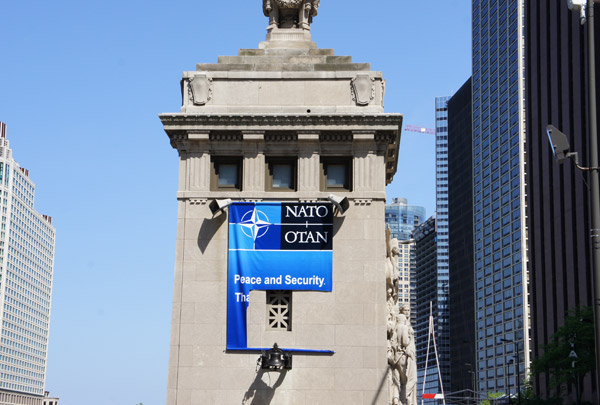
After coming back from the National Nurses United rally, just before talking to Mark Jacobson of the German Marshall Fund—until last summer, he worked at the NATO International Security Assistance Force headquarters in Kabul, and before that was with the DoD—about the summits, I came across an article about the possibility that Congress may not have the votes to back the president's plan (and NATO's) for an Afghanistan withdrawal, because a plan to accelerate it has slightly bipartisan support, and perhaps enough to get out of the House. But it's stuck:
The vote would have been a massive embarrassment for the White House, coming as NATO leaders are gathering in Chicago this weekend to discuss the war strategy. Republicans rarely miss a chance to embarrass the president, but party leaders—including Mitt Romney—have long supported the war and have at times criticized Obama for drawing down even on his longer timetable.
But this should still be a huge story, particularly for reporters covering the summit in Chicago this weekend. Backed by constituents that are sour on the decade-long war in Afghanistan, Congress no longer has the votes to support the president’s plan.
The U.S. pays most of NATO's bills, and is by far the largest combat contingent in Afghanistan, 69 percent of the troops. If you've been following the international NATO news, you might have read about how it's a big deal that new French president Francois Hollande ran on an accelerated-withdrawal platform, which is part of why he's being talked up by Obama and Hillary Clinton in D.C. before the summit commences. France represents four percent of troops in Afghanistan; if Congress is somehow able to push through an accelerated withdrawal, that would be an obviously much bigger deal.
Jacobson doesn't think France and Hollande are too much to worry about. "I think Hollande will recognize the reality of the world. It's going to be clear to him that if he does something drastic, he'll lose the ability of the French to play a role in NATO…. An alliance is about balancing national interests with international interests. He's proven to be an adept politician and will be able to balance them." It's not without precedent; Canada's Stephen Harper planed an early exit, but decided "with some reluctance" to continue participating. "I've been calling it the Canadian solution," Jacobson said. "Prime Minister Harper promised a withdrawal, but Canada is still there, with about 900 trainers."
Either way, it's a matter of time, either on NATO's timetable or one accelerated by a couple years. So while some of the summit will be devoted to what's next for NATO, both in the short term (will NATO still be leading combat in 2014?) and the long (Smart Defense), a significant part of it will be devoted to looking back, or at least looking forward on how to look back, as the Truman Project's Erik Wallenius explained. "How will NATO define success? They'll be looking at benchmarks, metrics, and timetables. In black and white, it's how we all might judge whether Afghanistan was a success or failure."
There's a phrase going around about that: "Afghan good enough." Really: Not sic.
[U.S. officials] acknowledge privately that the bar has been significantly lowered on how success in Afghanistan is defined after 11 years of combat.
“Look, this is Afghanistan,” one administration official said in an interview. “Is it going to be Switzerland? No. But is good enough for Afghanistan? That’s where we need to get to.”
The phrase seems to originate with a recent paper by Anthony H. Cordesman, "Time to Focus on 'Afghan Good Enough.'" It has a lot of unsatifying language:
Every day seems to widen the gap between the goals the United States is seeking to achieve in Afghanistan and its ability to achieve them.
[snip]
The question is what, if anything, can now be done that might offer many, if not most, ordinary Afghans some realistic hope of security and stability through the withdrawal of most combat forces and beyond. The answers are not pleasant….
[snip]
As for Pakistan, it is not clear that the United States can even use aid to bribe its leadership into meaningful cooperation. If the United States can “rent” Pakistani cooperation, success will consist largely of regaining some access to Pakistani supply routes…. [Like this.]
[snip]
One key will be to give real meaning to the effort to reshape Afghan forces as a much smaller and more affordable force….
And:
Local Forces and “Warlords” Are Better Than Nothing
So that's what's in store this weekend within the summit: how to have defense in the age of austerity, how to define success when success might mean "good enough," and good enough might not be.
Previously: How to participate this weekend or just follow along on the computer; unilateralism; what "smart defense" is; Afghanistan; Q&A with Lori Healey; weekend survival guide.


